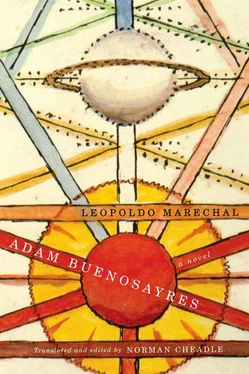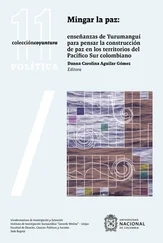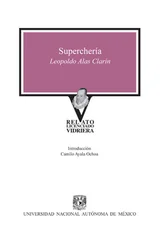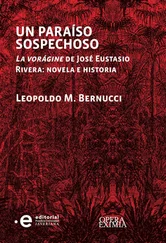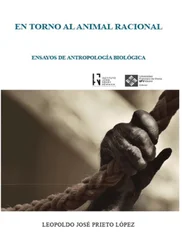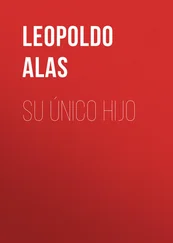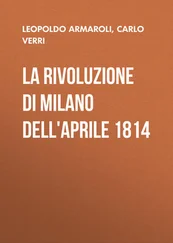Here, Don Ecuménico (beast, man, or whatever he was) paused, apparently in silent communion with his memories. In the second part of his talk, I’d detected a dash of irony, a goodly dollop of rapture, and quite a bit of resentment, all of which made me realize that his spiral-proboscis was getting excited. Then he took up his tale again:
— My adolescence was over, and I entered manhood with vigour. One thing and another led me to a career as an insurance broker — a perilous occupation. But I made a go of it, helped along perhaps by my rich imagination, or by the eloquence acquired through my epistolary dialogues with Dolores. My tendency to abstract thought waned little by little; concurrently, I felt as if roots sprouted avidly from the bottom of my being, sinking proboscis-like and absorbent deep into the humus of life, into the juicy matter of humanity, into the concrete clay of actuality. Then I met Raimunda and fell cautiously in love with her. Our marriage was a paragon of circumspection: if Dolores had been like a daydream with all the trappings, Raimunda seemed like the living image of reality, with its inflexible but reassuring laws, its horizon limited but secure. Raimunda was like a plot of good earth to be ploughed and fertilized for a harvest of flowers and fruits, and upon whose breast one lays oneself down to rest deeply, the way children and farmers do. And I clung to that earth and her continuance in children; gradually, I renounced my own being and its non-transferable longings, in order to live the life of those around me, to care for the sleep of others, to suffer their sorrows and witness their joys. Then I made an observation and discovered a truth. I observed that, through love, all my rights had been turned into duties. I discovered that, by loving and extending the life of that earth, I had only enlarged my territory of sorrow and my area of vulnerability.
”Nonetheless, a solid world had formed around me. My day began with Raimunda bustling about and the kids squealing happily; it ended in a to-and-fro of children’s potties and the sixth edition of a daily paper, mechanically read. Between these two parentheses, I sold insurance, negotiated contracts, rushed up and down streets, climbed staircases, encountered faces and voices, always the same ones. The upshot was that, through sheer repetition, I gained a blind faith in the stability of that little universe. And suddenly, when I believed most firmly in that stability, death set to work — unannounced, with no logic, stupidly, like a blind reaper who’d snuck into a wheatfield and indiscriminately hacked at green stalks and ripe ones alike. But the scythe cut and cut: the wife and a boy-child were felled. I still wonder what terrible laws or what dark necessity required that extraordinary destruction.
A tremor became perceptible in the narrating voice. I looked at the insect’s face; moisture was condensing around his polyhedron eyes, swelling into a big, round teardrop. A moment later, every trace of sentimentality had been erased from his face, and Don Ecuménico assumed an air of abstraction, as though his story was about to enter the arid terrain of geometry:
— After my home had come tumbling down around me, he continued, I went through a period of death-like stupor. As I said earlier, by renouncing my being I had taken on the form of the creatures I loved. No sooner was I alone than I found myself in a disconcerting situation. On the one hand, I was now without my ego, which had been converted into love for others; but on the other hand, I could hardly go looking for it beyond the frontier of death in the creatures I’d loved, now rapidly decomposing to bits, remnants of the flesh of my flesh. That state did not last long, naturally. In having a family, I had embarked on a movement of dispersion, or alienation. There now followed a movement of concentration, thanks to which — in an evil hour! — I was able, in solitude, to recuperate my powers. I then began to reflect on the mysterious cause, the invisible motor that so easily built up and tore down the things of this world. In childhood, thanks to my mother’s zeal, I’d acquired the idea of a God who rules his creatures with love; I even recall making quite a fervent first communion. That notion had persisted in my soul, but like a seed that does not find favourable soil, its power to germinate remained latent. And now the seed was sprouting within me, unfolding leaves and extending roots — not with the carefree innocence of my early years, however, but as though under the querulous surveillance of a mad gardener. My recent experience, coloured by a resurgence of the metaphysical mistrust that had tormented my childhood, made me see in the decay and mutability of things an obscure sin, now urgently in need of redemption. At the same time, I no longer saw the merciful, benevolent face of God, but rather his harshness, and now feared him as an unknown force or an enraged Demiurge to be mollified and contained through self-mortification. To that end, I took up a life of penance as exacting as it was absurd. For everyone else, I was still Don Ecuménico the insurance broker, the guy who worked the same old pitch, the same jokes and witticisms, all of which had become second nature for me. But now my wit was an automatic reflex, my quips mechanical. In my own eyes, I was a chastened soul who no longer took part in the illusory game of the world, who closed his eyes to deceitful images and his ears to phantom allures; a man who systematically repressed, in his skin, smell, and taste, the tendency of the senses to be carried away by the grand deception of worldly things.
”And so, without knowing it, I imitated the ancient ascetics and eventually came round to an act that others had once made sublime and which in my case turned out to be a miserably sad comedy: self-flagellation. I recall, not without shame, the first time I stood before the ironic mirror in my room and coolly stripped down; still cool, I gave myself fifteen or twenty lashes to the buttocks with an old belt, a gift from Raimunda, its steel buckle engraved with my initials. The still silence of midnight, the ascetic cold of my room, the indignant astonishment of my body groaning under the lashes, and the satisfaction of my triumphant soul all produced in me a certain intoxication that faded into tranquil slumber. The acts of flagellation continued the following nights. But it wasn’t long before I noticed that, far from leading me to great revelations, those belt-blows were degenerating into a glacial mechanism, and that my intoxication was limited to a certain prideful complacency. Later, I noticed in alarm I was no longer alone in my chamber of self-torment; invisible eyes were following every one of my gestures, malevolent voices were whispering here and there, abominable laughter erupted and subsided in the corners. At last I realized how dangerous and absurd my game was, when not conducted under the tearful gaze of the angels. Meanwhile, news of my penitence had leaked into the rooming house I lived in then — it was run by a miserable harpy ironically named Doña Consuelo. 178Apparently, through the thin walls, my neighbours’ ears had picked up the swish-swash of nocturnal whippings and caught snippets of the monologues I unconsciously muttered to spur myself on. Alarming rumours were circulating, glances and knowing gestures were exchanged, until finally the painful truth came out: “Don Ecuménico has gone bonkers.” Thanks to my remaining shred of prudence, I renounced the belt-lashings and recovered my sanity. It didn’t require any big effort. Once again I let myself drift on the dreary river of happenstance. But my struggle with the Divinity wasn’t over, merely postponed: it resumed when I entered the sinister House of Books and met the Librarian Who Peered Out from Hazy Distances.
Читать дальше
